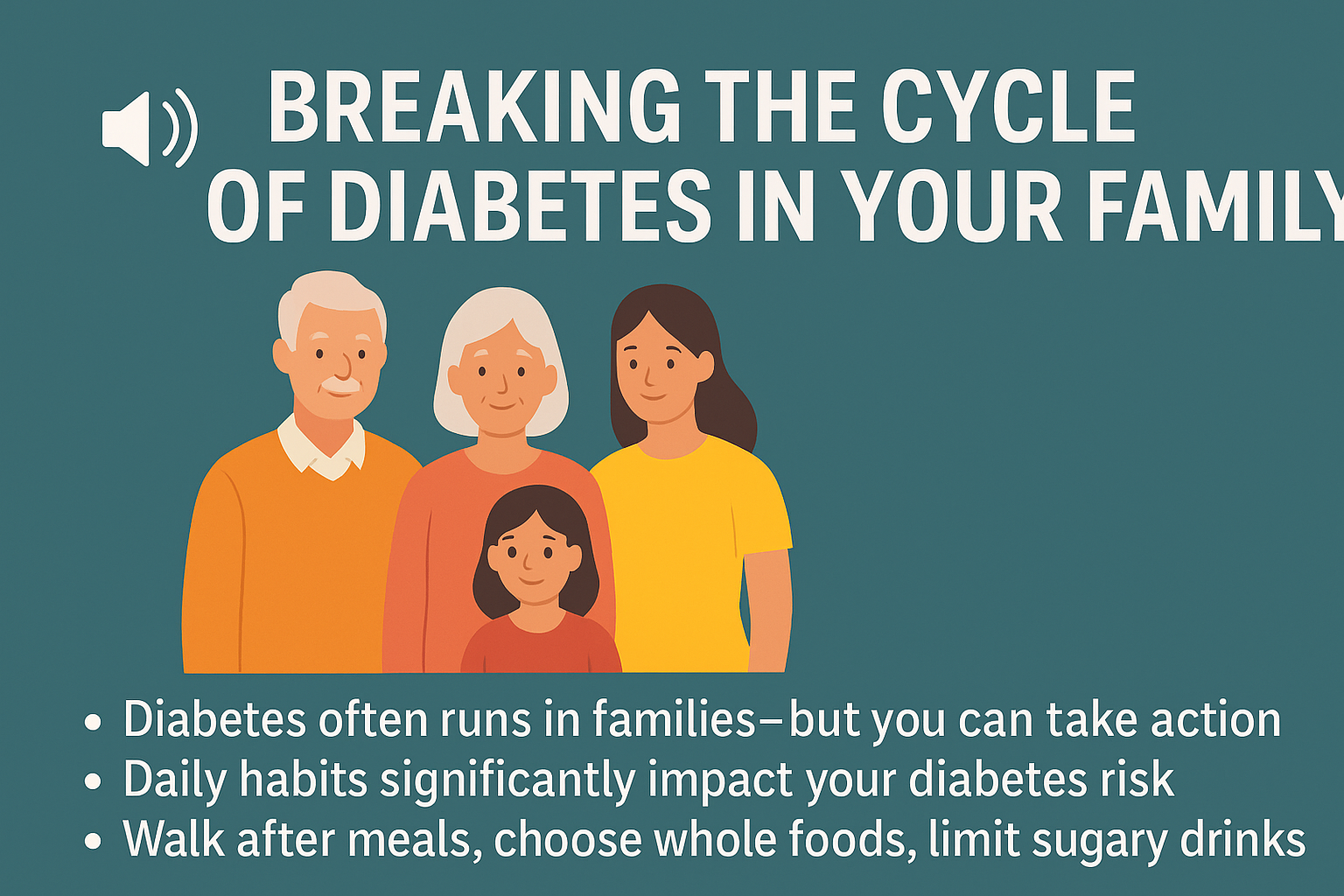We often hear that diabetes “runs in the family,” and while that may be true, there’s much more to the story than just genetics. This short audio message explains how you can take simple, daily steps to reduce risk and rewrite your family’s health story.
👉 The source mentioned in the audio is based on my full article:
Does Diabetes Run in the Family? Here’s the Real Truth
In that article, I explained how habits—more than heredity—play a decisive role in whether you develop diabetes. The audio message below summarizes the most critical points, making it easy to share with family and friends.
This is the first-ever audio article on the site, designed to give you another way to learn, whether you’re driving, walking, or relaxing. Give it a listen and share it with someone who needs a quick, hopeful message.
🎙️ Listen Now:
✅ Take-Home Messages
- Diabetes isn’t destiny. Just because your parents or siblings have it doesn’t mean you will too.
- Your daily choices—especially your food, activity, and sleep—can prevent or delay diabetes.
- Even small actions matter:
- Walk for 10 minutes after meals
- Add vegetables to every plate
- Cut down on sugary drinks
- Genes load the gun, but lifestyle pulls the trigger.
- By changing your habits, you can break the cycle and protect the next generation.
Don’t Get Sick!
Stay current by subscribing. Feel free to share and like.
Follow me on Truth Social, Gab, Twitter (X), Facebook, Follow, and Telegram.
Related:
- Health Benefits of Alpha Lipoic Acid: The Excellent Antioxidant
- Flaxseed: Lowers Sugar And Awesome Source of Valuable Omega 3
- Mastering Diabetes: Prevent Hypoglycemia with Smart Medication Adjustments
- The Simple Way To Keep Blood Sugar Low: Breakfast
- Meal Timing: A Practical Guide To Weight Loss And Better Health
- 18 Powerful Strategies To Prevent Blood Sugar Spikes During The Holidays
- A Tool Box of Strategies to Prevent Blood Sugar Spikes When Eating High Glycemic Index Foods
- The Blood Sugar-Lowering and Metabolic Effects of Vinegar
- Ways to Lower After-Meal Blood Sugar when Eating White Bread
- A High-Protein Breakfast Can Lower Blood Sugar the Whole Day
- Eating rather than skipping breakfast results in lower blood sugars the whole day
- Pistachios improve insulin resistance and inflammatory markers
- Veggies Meat Carbohydrate Sequence Prevents After Meal Sugar Spike
- The Blood Sugar Lowering and Metabolic Effects of Vinegar
- Ways to Lower After-Meal Blood Sugar when Eating White Bread
References:
- National Human Genome Research Institute. “Autosomal Dominant.” Genome.gov, https://www.genome.gov/genetics-glossary/Autosomal-Dominant-Disorder
- National Human Genome Research Institute. “Autosomal Recessive.” Genome.gov, https://www.genome.gov/genetics-glossary/Autosomal-Recessive-Disorder
- National Hemophilia Foundation. “What Is Hemophilia A?” Hemophilia.org, https://www.bleeding.org/bleeding-disorders-a-z/types/hemophilia-a#:~:text=Hemophilia%20A%2C%20also%20called%20factor,have%20no%20previous%20family%20history.
- Leslie et al. Understanding diabetes heterogeneity: key steps towards precision medicine in diabetes. The Lancet Diabetes & Endocrinology. Volume 11, Issue 11, November 2023, Pages 848-860
- Ling C, Rönn T. Epigenetics in Human Obesity and Type 2 Diabetes. Cell Metab. 2019 May 7;29(5):1028-1044. doi: 10.1016/j.cmet.2019.03.009. Epub 2019 Apr 11. PMID: 30982733; PMCID: PMC6509280.
- Simmons RA. Developmental origins of adult disease. Pediatr Clin North Am. 2009 Jun;56(3):449-66, Table of Contents. doi: 10.1016/j.pcl.2009.03.004. PMID: 19501686; PMCID: PMC3357632.
- Knowler WC, Barrett-Connor E, Fowler SE, Hamman RF, Lachin JM, Walker EA, Nathan DM; Diabetes Prevention Program Research Group. Reduction in the incidence of type 2 diabetes with lifestyle intervention or metformin. N Engl J Med. 2002 Feb 7;346(6):393-403. doi: 10.1056/NEJMoa012512. PMID: 11832527; PMCID: PMC1370926.
Audio by Notebook LM
© 2018 – 2025 Asclepiades Medicine, LLC. All Rights Reserved
DrJesseSantiano.com does not provide medical advice, diagnosis, or treatment
As an Amazon Associate, I earn from qualifying purchases
Amazon Basics Neoprene Dumbbell Hand Weights for Exercise and Muscle Toning
$12.99 (as of May 29, 2025 15:54 GMT -04:00 - More infoProduct prices and availability are accurate as of the date/time indicated and are subject to change. Any price and availability information displayed on [relevant Amazon Site(s), as applicable] at the time of purchase will apply to the purchase of this product.)Molly's Suds Dishwasher Pods | Clean Dishwasher Detergent, Cuts Grease & Rinses Clean (Residue-Free) for Sparkling Dishes | 60 Auto-Release Tabs (Unscented)
$19.99 ($0.33 / Count) (as of May 29, 2025 16:02 GMT -04:00 - More infoProduct prices and availability are accurate as of the date/time indicated and are subject to change. Any price and availability information displayed on [relevant Amazon Site(s), as applicable] at the time of purchase will apply to the purchase of this product.)Great Big Beautiful Life
12% OffOriginal Sin: President Biden's Decline, Its Cover-Up, and His Disastrous Choice to Run Again
12% OffOneOdio Wired Over Ear Headphones Hi-Res Studio Monitor & Mixing DJ Stereo Headsets with 50mm Drivers and 1/4 to 3.5mm Jack for AMP Computer Recording Podcast Keyboard Guitar Laptop - Black
17% OffDiscover more from Don't Get Sick!
Subscribe to get the latest posts sent to your email.




















